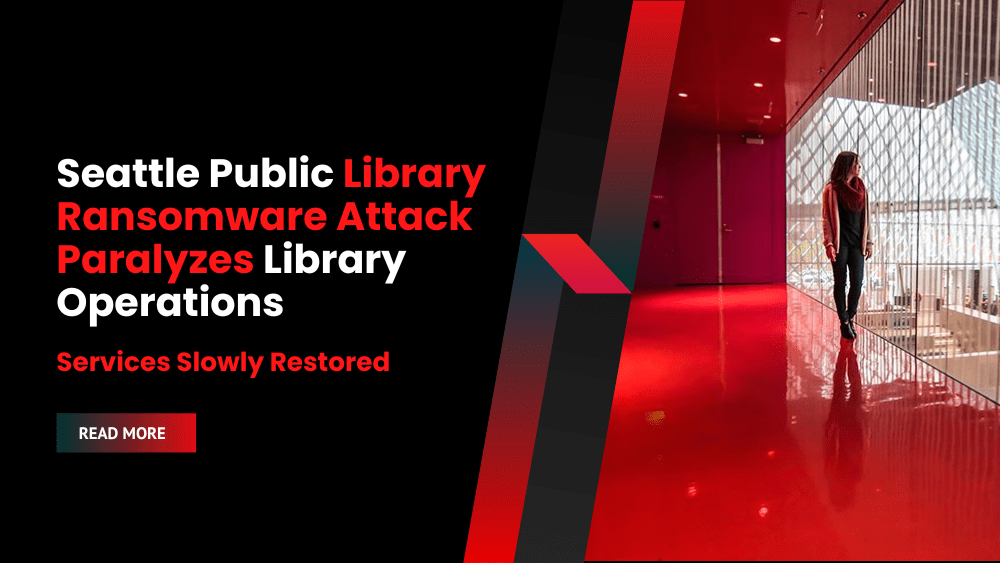Services Slowly Returning After the Ransomware Attack on Seattle Public Library
The Seattle Public Library ransomware attack over the Memorial Day weekend crippled its systems and disrupted access to critical digital services. However, in the following weeks, library officials worked tirelessly to restore functionality, with some key resources now available once more to the public.
According to Laura Gentry, head of communications for SPL, the incident affected access to “staff and public computers, online catalog and loaning systems, e-books and e-audiobooks, in-building WiFi, and the Library website.” To stop the ransomware from spreading, all systems were immediately taken offline.
Third-party cyber forensic experts and law enforcement were engaged to investigate the breach and assess the full scale of disruption. “Securing and restoring our systems is where we are focused,” emphasized library officials in a statement, apologizing for outages but pledging transparency through updates.
The Devastating Ransomware Attack on Seattle Public Library: How it all unfolded
On the morning of May 25th 2024, the Seattle Public Library(SPL) detected a major ransomware attack on its systems just as planned network maintenance was scheduled to begin over the Memorial Day weekend.
Criminal hackers had exploited vulnerabilities to deploy ransomware that encrypted vital files and systems, rendering them inaccessible without payment of ransom in cryptocurrency. The ransomware rapidly spread across SPL’s IT infrastructure, crippling access to core services.
To contain the spread, SPL took the immediate decision to take all systems and networks offline preemptively. Third party cybersecurity experts were engaged to investigate the breach and determine the full impact. Law enforcement agencies were also informed to coordinate response and investigate the criminal actors involved.
Seattle Public Library Ransomware Event Caused Mass Disruption to Critical Library Services
With technology access paralysis, library services were thrown into disarray. The 27 physical branches could still provide manual access to collections. However, for many patrons reliant on digital services for work, education and entertainment, this was a major blow.
The effects rippled far beyond SPL locations. School assignments could not be completed, job functions were impaired, and many recreational activities moved online.
Gradual Restoration of Some Services After SPL Cyberattack
Despite the scale of disruption, SPL staff worked round the clock in subsequent weeks to bring systems back. By late May, the event calendar and access to major newspaper databases was restored through the library website.
The Hoopla digital media borrowing service also resumed partially through app workarounds.
However, the Libby e-book app remained inaccessible, disrupting book loans. Patrons were advised to postpone holds to not miss out when the functions were repaired.
SPL provided regular updates applauded for maintaining transparency and public trust during recovery operations.
While the scale and technique of the SPL Cyberattack distinguished it, public libraries have faced growing ransomware risks globally.
Persistent Cyber Risks for Libraries Globally
While this incident had unique attack techniques, ransomware poses a sustained challenge globally. Lengthy outages followed incidents in London and Toronto public library systems too last year. As focal community institutions, libraries present rewarding targets given the disruption and prospects for ransom payments.
With attacks increasing, libraries urgently need improved security measures. But as public services, their resources are constrained compared to corporate targets. Coordinated efforts across sectors are vital to strengthen response capabilities and undermine the criminal economies sustaining ransomware propagation.
Weeks after the SPL cyberattack, restoration of SPL’s digital services proceeds steadily. The Library looks ahead to complete resumption of e-book access and full operational stability. Patrons remain hopeful that this treasured community asset can overcome the aftershocks of such a crippling cyber incident with support from all.









